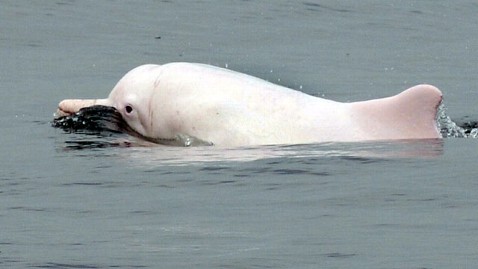Hong Kong's Pink Dolphins Dwindle to Just Dozens

Laurent Fievet/AFP/Getty Images
By SASHA HAN
BEIJING - The Chinese white dolphin, treasured by the people of Hong Kong people for its pink color and friendly nature, is endanger of being exterminated by pollution and a traffic jam of boats.
The dolphin, once the official mascot of the 1997 sovereignty changing ceremonies, draws tourists from around the world.
But the delightful dolphins are rapidly becoming in danger of extinction with the population decreasing by nearly 60 percent in the last decade. Conservationists warn that action must be taken if people hope to be able to see the dolphin in the coming years.
According to the Hong Kong Dolphin Conservation Society the number of dolphins has decreased from 159 in 2003 to 61 just last year. This figure is expected to be significantly lower when the organization releases its updated report in late June.
Experts attribute this population decrease to five main factors: habitat loss from coastal development, water pollution, underwater noise pollution, vessel collision, and overfishing.
Beginning in the mid 1990's, over 3,500 acres of sea have been reclaimed in Hong Kong's western waters. This has inadvertently damaged a large portion of the dolphin's habitat in addition to greatly affecting the fishing industry. This has subsequently lead to a decrease in the dolphin's food supply.
The decline of the pink dolphins gained attention earlier this spring. During a dolphin watching tour, a popular activity for tourists visiting Hong Kong, a group watched as a mother dolphin struggled to lift the body of her dead calf above the water. This scene continued for about 30 minutes. In the end the dolphin was ultimately unable to revive the calf and was forced to swim away without it. A video of this tragic event quickly became viral, inciting considerable discussion among netizens worldwide.
A spokesperson from Hong Kong Dolphinwatch, Janet Walker, believes that the calf died due to "toxins in the mother's milk, accumulated from polluted seawater."
The pink dolphin is currently classified as a "near-threatened" species by the International Union for the Conservation of Nature (ICUN) Red List of Threatened Species while China places it as a Grade 1 National Key Protected Species, a list that includes the giant panda and golden monkey.
The announcement made earlier this week was not the first time a conservation group has attempted to increase public awareness about the dwindling dolphin population. During January 2012 the Ocean Park Conservation Foundation Hong Kong joined forces with a Chinese university to set up a DNA bank in order to save the animal from extinction.
Samuel Hung, head of the Dolphin Conservation Society, urges both government officials as well as Hong Kong citizens to stand up for the dolphins, claiming that the health of the dolphins is a reflection of "the overall health of our marine ecosystem."